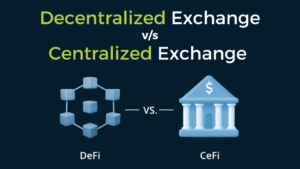What are the Major Differences Between Centralized and Decentralized exchange CEX & DEX?
What is CEX?
Difference Between Centralized and Decentralized Exchange. The CEX is an abbreviation for the Centralized Crypto Exchanges. The centralized crypto exchanges allow their users trade one cryptocurrency for the another. Since, the centralized crypto exchanges are managed by a company having a centralized decision-making power, hence, they are called CEX or centralized crypto exchanges. The Uniswap, 1inch, PancakeSwap, Binance, Coinbase, Gemini, Kraken, and Nexo are the CEXs or centralized crypto exchanges. Difference Between Centralized and Decentralized Exchange
What are CEX Benefits?
The CEX or Centralized Crypto Exchanges offer you following benefits:
- Allow you to convert fiat currency into cryptocurrency.
- Allow you to exchange multiple cryptocurrency tokens.
- Allow you trade with margin accounts.
- Offer you the prospects of interest income on assets.
- Offer you the customer support service.
What are CEX Drawbacks?
The CEX or Centralized Crypto Exchange offers you following drawbacks:
- Don’t allow you to hold your cryptocurrency.
- Put you at the risk of regulatory authority compliance.
- Manage and reconcile your cryptocurrency accounts themselves.
What is DEX?
The DEX is an abbreviation for the Decentralized Crypto Exchanges. The decentralized crypto exchanges run as smart contracts on the public blockchains like Ethereum, Cardano, Polkadot, Solana etc. The decentralized exchanges allow peer-to-peer trading through orderbooks that are hosted on the blockchain. You can use the DEX or decentralized crypto exchanges to buy cryptocurrencies with fiat currency (USD) or swap between cryptocurrencies through the orderbooks. The Coinbase, Binance, Crypto.com, Uphold, and eToro are the DEXs or decentralized crypto exchanges. Difference Between Centralized and Decentralized Exchange
Read Also – Developing An NFT Marketplace – A Complete Guide
What are DEX Benefits?
The DEX or Decentralized Crypto Exchanges offer you following benefits:
- Allow you the control and custody of your funds.
- Allow you to trade anonymously.
- Offer you a variety of financing apps.
- Charge lower transaction fees than CEX.
- Requires No Third-Party Identity Verification.
What are DEX Drawbacks?
The DEX or Decentralized Crypto Exchanges offer you following drawbacks:
- Exchange no fiat currencies.
- Offer no customer service.
- Have volatility issues.
- Have liquidity issues.
- Use complex trade algorithms.
What are the major differences between the CEX & DEX?
The main differentiators of centralized and decentralized crypto exchanges:
- Custody of Crypto Assets
- Security of Crypto Assets
- Trading Costs of Crypto Assets
- Trading Pairs of Crypto Assets
- Trading Risks of Crypto Assets
- Liquidity of Crypto Assets
- Regulatory Compliances
Custody of Crypto Assets
Difference Between Centralized and Decentralized Exchange. The centralized crypto exchanges are the custodians of your cryptocurrencies and crypto tokens. Since, the centralized crypto exchanges don’t provide you the private key of your crypto account, you must depend on the centralized crypto exchanges to hold your crypto assets and process your crypto transactions upon request.
The decentralized crypto exchanges provide you the custody of your crypto assets that you can hold in your own crypto wallet and transfer to anyone when required by using your private key to authorize and process the transaction yourself. Difference Between Centralized and Decentralized Exchange
Read Also – How To Create Your Own Blockchain? A Step-By-Step Guide
Security of Crypto Assets
The centralized crypto exchanges are always on the radar of the hackers. The hacking groups have breached the security of many centralized crypto exchanges (E.g., Mt. Gox and Bitmart) successfully to steal the crypto assets of their customers. The architecture of the centralized crypto exchanges is such that they are the bigger target for the hackers as the security breach could lead to the loss of hundreds of millions of dollars in value.
The decentralized crypto exchanges could also get hacked but the value of lost crypto assets won’t be as staggering as that of centralized crypto exchanges because the hackers could only breach the individual smart contracts – not the crypto exchange as a whole. Thus, your crypto assets are safer on a decentralized crypto exchange – provided – you are not a liquidity provider.
Trading Costs of Crypto Assets
Difference Between Centralized and Decentralized Exchange. You might have read often that the centralized crypto exchanges typo cheaper in terms of the trading costs of the crypto assets, but this is typo true in the real sense. Of course, the decentralized crypto exchanges have lower maker-taker fees for individual trades but settling the trades on the blockchain often increase the overall trading costs compared to a centralized crypto exchange.
For example, when you trade on the decentralized crypto exchanges, you pay gas fees for several actions like gas fee for transaction approval, gas fee for token swap, gas fee for token wrap etc. Moreover, your trading costs could also increase in the case of a slippage (slippage is the loss occurred due to the change in the value of cryptocurrency between the order initiation and the order execution time) while trading on the decentralized crypto exchange. Difference Between Centralized and Decentralized Exchange.
Read Also – How To Develop A Crypto Exchange Like Binance?
Trading Pairs of Crypto Assets
The centralized crypto exchanges offer very few trading pairs of crypto assets i.e., cryptocurrency to cryptocurrency pairs but they give you the option to trade the crypto assets against the fiat currencies i.e., cryptocurrency to fiat Currency pairs.
The decentralized crypto exchanges offer you a wide range of trading pairs i.e., cryptocurrency to cryptocurrency pairs but you cannot trade cryptocurrency to fiat currencies on the decentralized crypto exchanges as they don’t offer you such trading pairs.
Trading Risks of Crypto Assets
The centralized crypto exchanges come with higher trading risks of the crypto assets. Since they are the custodians of your crypto assets, you are more likely to lose all your crypto assets in case your centralized crypto exchange gets hacked.
The decentralized crypto exchanges have the risks like impermanent loss for the liquidity providers for the volatile trading pairs of the crypto assets. They also come with the risk of the rug pulls i.e., fraud schemes where anonymous founders trick people into investing money for a cryptocurrency project which is then abandoned.
Liquidity of Crypto Assets
The centralized crypto exchanges offer higher liquidity of crypto assets. It means you can trade and liquidate your crypto assets in large numbers on the centralized crypto exchanges.
The decentralized crypto exchanges offer the lower liquidity of the crypto assets. It means that you cannot trade and liquidate your crypto assets in large numbers on the decentralized crypto exchanges because this could lead to the slippage which means your large trading and liquidate orders will be completed at worst prices.
Also, you have typo pay higher trading costs on the decentralized crypto exchanges if you want to trade and liquidate a large number of crypto assets.
Regulatory Compliance
The centralized crypto exchanges must comply with the strict Know Your Customer (KYC) rules of their state’s central banks and Anti-Money Laundering (AML) laws of the state’s market regulators like the Securities and Exchange Commissions.
The decentralized crypto exchanges don’t need to comply with any Know Your Customers (KYC) rules and Anti-Money Laundering (AML) Laws because they are still not considered as the financial intermediaries or counterparties by their state’s central banks and market regulators. However, this may not be the case forever.
Read Also – How To Start A Cryptocurrency Exchange Using White Label Crypto Exchange Software?
CEX or DEX – Which is better for you?
Difference Between Centralized and Decentralized Exchange. The centralized crypto exchanges are better for you if you are engaging in the crypto trade for the first time because their crypto assets are pre-vetted and their user-interface is very easy-to-use for the new crypto traders.
The decentralized crypto exchanges are better for you if you have been trading in the crypto assets for a while and are experienced and confident enough to manage the crypto assets trade on the decentralized crypto exchanges. Difference Between Centralized and Decentralized Exchange



